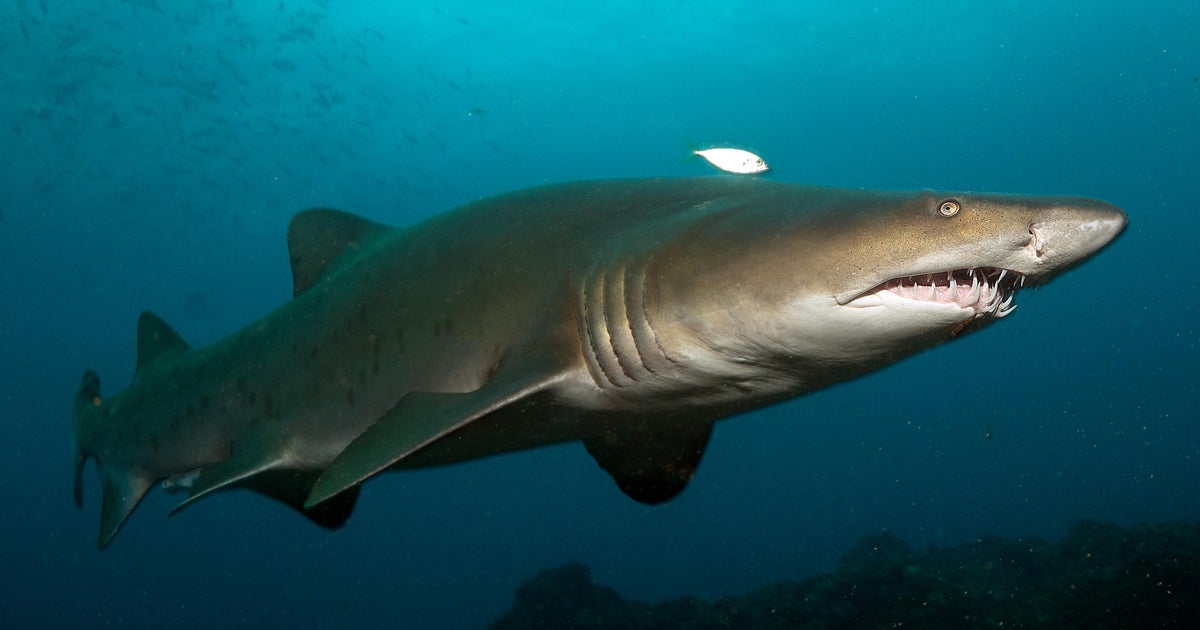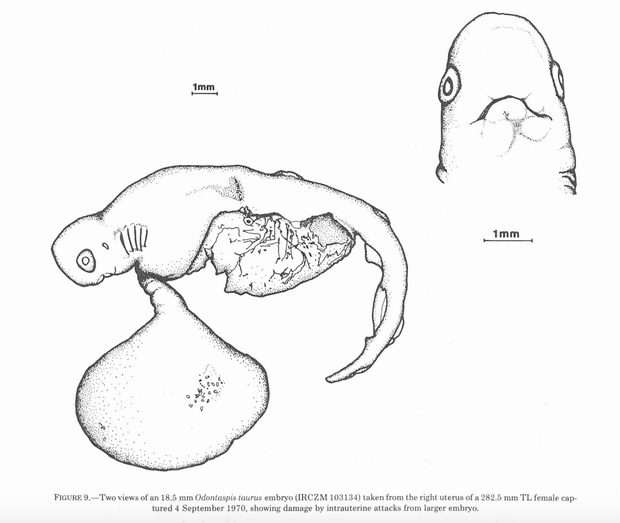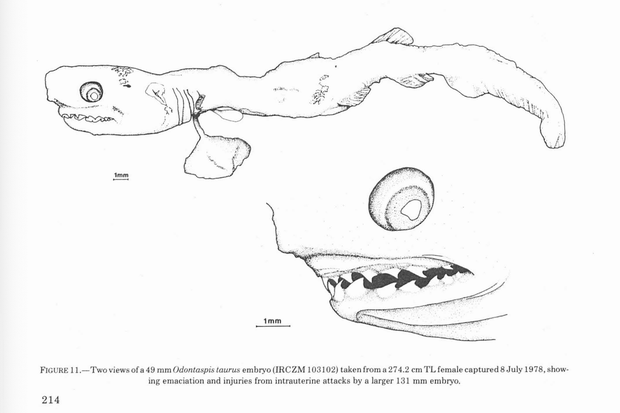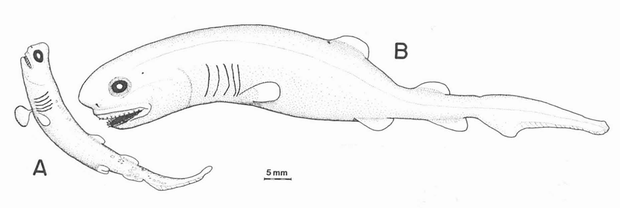CBS News
These cannibal baby sharks eat their siblings in the womb – and sketches show just how gruesome it can be

As adults, sand tiger sharks are known for being relatively non-aggressive. But as babies, these animals engage in a cannibalistic war with dozens of siblings in which only one survives.
It’s all part of a natural occurrence known as intrauterine cannibalism. Sand tiger sharks are perhaps one of the most well-known species in which this occurs. These sharks are ovoviviparous, meaning that their offspring grow in eggs in the sharks’ uteri until they hatch, at which point, they emerge into the ocean.
“It is survival of the fittest. The strongest one will emerge,” Lizeth Webster, curator of fish and invertebrates at the Long Island Aquarium in New York told CBS News. “The healthiest one will absorb all of the nutrients, not leaving enough for the others, so it will consume others in the womb.”
NOAA/Reproduction and Embryonic Development of The Sand Tiger Shark, Odontaspis Taurus (Rafinesque)
Sand tiger sharks are known for having two uteri. In each one, a female shark will have between 16 and 23 fertilized eggs. But not long after they develop their teeth, the biggest and most advanced of the embryos that’s often the first to hatch will kill and eat all the siblings it shares a uterus with, as well as any leftover yolk sacs. After being in the womb for eight to nine months, two pups – one from each uterus – will make it out into the sea.
“That’s how we get apex predators,” Webster said. “The strongest will survive.”
NOAA/Reproduction and Embryonic Development of The Sand Tiger Shark, Odontaspis Taurus (Rafinesque)
Shark scientists have known about this process for decades. In research published in NOAA’s Fishery Bulletin in 1983, they even provided visual depictions of the process.
In one case, they observed “a large hatched embryo (100 mm) that had attacked and badly damaged (puncture wounds and torn gut) a 51 mm embryo. … It is possible that the 51 mm embryo had not hatched prior to the attack.”
NOAA/Reproduction and Embryonic Development of The Sand Tiger Shark, Odontaspis Taurus (Rafinesque)
That cannibalism, however, meets a hard stop whenever the sharks are officially born. Sand tiger sharks, otherwise known as ragged-tooth sharks and grey nurse sharks, tend to eat herrings, eels, squids, crabs and lobsters, among other animals.
And no, humans aren’t on the list. The animals are known for not being aggressive toward humans, although they will become defensive if necessary. Once they grow, Webster described the animals as “calm.”
“Usually in the wild, they swim in large packs,” she said. “…When they’re in large groups like that they tend to be a lot calmer because they do have to swim in unison with other sharks. They just look like they’re floating and they’re calm.”
And while eating their siblings does help ensure that strong pups are born, it also makes it difficult for the species to survive.
The sharks, which can grow to be up to 10 feet and 500 pounds, according to the Long Island Aquarium, have one of the lowest reproductive rates among all shark species. According to the Aquarium of the Pacific, they only give birth every two years. And that poses a major problem considering the species has reached critically endangered status.
According to the IUCN Red List, populations have been decreasing worldwide, with the Mediterranean population being “locally possibly extinct,” as there have been no records of the shark in the area since 2008. Overall, researchers with the group believe the species has seen a more than 80% decline over the past 74 years “due to levels of exploitation.” Urban and industrial development, overfishing, climate change and severe weather impacting their habitats remain the biggest threats to the species.
CBS News
Kamala Harris discusses U.S. relationship with Israel

Watch CBS News
Be the first to know
Get browser notifications for breaking news, live events, and exclusive reporting.
CBS News
Nature: Aspens in Utah – CBS News

Watch CBS News
Be the first to know
Get browser notifications for breaking news, live events, and exclusive reporting.
CBS News
Sabrina Carpenter on “Short n’ Sweet”

Watch CBS News
Be the first to know
Get browser notifications for breaking news, live events, and exclusive reporting.










